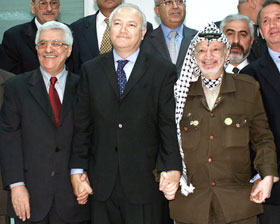RAMALLAH, 1 May 2003 — After months of delays, an international road map to revive the Middle East peace process and end 31 months of bloody conflict was finally presented to the Palestinian and Israeli premiers yesterday.
Israel’s Ariel Sharon was given a copy of the plan by US Ambassador Daniel Kurtzer in Jerusalem and Palestinian Mahmoud Abbas received his from envoys from the United States, United Nations, European Union and Russia, which make up the diplomatic quartet that drafted the plan.
The release of the road map, designed to kickstart long-dormant peace talks, came after moderate reformist Abbas and his new Cabinet were sworn in, and despite extremists blowing up a Tel Aviv bar overnight, killing three people.
Abbas, the first ever Palestinian premier, was sworn in by Palestinian President Yasser Arafat, whose replacement is sought by Israel and the United States.
It remained unclear how soon implementation of the plan would begin.
“I think the hope is that the two sides will get together and begin implementation. They will embark upon the road map together in good faith,” said one Western diplomat.
But top Arafat aide Nabil Abu Rudeina said Israel must make the first move toward implementing the plan and pull its troops out of Palestinian cities it has reoccupied since a series of bombings last June.
“The first step must be from Israel, which should withdraw its forces from our cities in compliance with what the road map says. The international community must force Israel to implement what’s in the road map; otherwise it will all just be a mockery,” he said.
Israel, however, appeared to believe the document was still up for discussion, with the premier’s office saying that the “process of submitting remarks began two weeks ago and will continue with the United States soon.” The road map has been regarded as a significant step toward resuming talks between the two sides.
It sets out the three stages that are to lead to the creation of a Palestinian state by the end of 2005 and an end to the conflict.
The Palestinians are called on to end anti-Israeli attacks and incitement to violence and neutralize powerful armed factions that have fueled the conflict.
Israel is called upon to pull back its forces from Palestinian self-rule areas it has reoccupied since the start of the Palestinian intifada in September 2000 and freeze the expansion of Jewish settlements in the Palestinian territories.
US President George W. Bush immediately urged Israel and the Palestinians to work with the United States, other powers, and “directly with each other to immediately end the violence and return to a path of peace.”
The European Commission welcomed Abbas’ swearing-in, saying it looked forward to working closely with him.
UN Secretary General Kofi Annan urged both sides to “stay the course”.
The release of the road map was jolted by a bombing in a Tel Aviv bar which killed three people, and was perpetrated by two British citizens of Arab origin.
A group linked to Arafat’s Fatah faction struck a busy Tel Aviv bar. The army gave Abbas some breathing space by not retaliating, but nevertheless continued its operations. It killed four people in the occupied territories, sparking fears that the intifada was entering a new phase of escalation.


